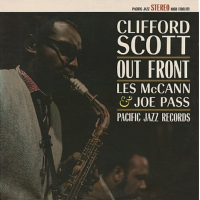
Jazz fans view the saxophone narrowly. What I mean is that we tend to think of the reed instrument in a straight line from Frankie Trumbauer in the '20s and Benny Carter and Bud Freeman in the '30s to Chu Berry, Coleman Hawkins, Ben Webster, Lester Young, Stan Getz, Sonny Rollins, Hank Mobley, John Coltrane and Wayne Shorter. But in the late 1940s and '50s, there were far more saxophonists recording R&B than jazz. Improvisation was more challenging than blowing the blues, the demand for R&B reed players was greater and the work was more plentiful with the advent of the 45rpm single in 1952.
This statement takes nothing away from the mighty work of R&B reed giants such as Louis Jordan, Maxwell Davis, Sam “the Man" Taylor, King Curtis, Eddie Vinson, Red Prysock, Earl Bostic, Red Holloway, Lynn Hope, Joe Houston and so many others. Let's also not forget that many jazz artists recorded on R&B singles, including Coltrane. R&B was simply a genre with different requirements, including power, gruffness, grittiness and stamina. If jazz was intellectual office work, R&B was manual labor.
Among R&B's many tough tenors who are largely forgotten today was Clifford Scott. Born in San Antonio, Texas, Scott began playing professionally in the mid-1940s. While still a teen, Scott joined Lionel Hampton's jump blues orchestra in 1948. By 1950, he was playing with Roy Milton and Jay McShann until 1953, when he rejoined Hampton for a year. Then Scott was hired by Bill Doggett and remained with the organist's ensemble until 1961, when Scott relocated to Los Angeles.
With Doggett in 1956, Scott co-wrote the instrumental hit Honky Tonk, Parts 1 and 2 with Doggett, guitarist Billy Butler and drummer Shep Shepherd and he played the standout sax lead.
In 1963, as R&B faded and was being replaced by Stax and Motown, Scott shifted to soul jazz. On the album Out Front, (Pacific Jazz), his first leadership recording with what might be Bob Porter's earliest set of liner notes, Scott played alto and tenor and was backed by Les McCann on piano, Joe Pass on guitar, Herbie Lewis on bass and Paul Humphrey on drums. Interestingly, Scott had a wonderfully slippery sound and double-time style perhaps most akin to Jimmy Forrest's.
Five of the album's songs are by McCann—Samba de Bamba, Over and Over, As Rosie and Ellen Dance, Cross Talk and Out Front. The others are Joe McCoy's Why Don't You Do Right and Scott's own Just Tomorrow. Scott, throughout, brings a fresh, eager sound that's beautifully framed by the quartet behind him, particularly McCann.
After this album, Scott worked in the Los Angeles studios and joined Ray Charles's band from 1966 to 1973, at which point he returned to San Antonio in 1976 and was based there for the balance of his career. Unfortunately, he didn't make too many more jazz albums. Scott died in 1993 at age 64.
JazzWax tracks: Sadly, Clifford Scott's Out Front never made the jump to digital and today can only be found on vinyl.
This statement takes nothing away from the mighty work of R&B reed giants such as Louis Jordan, Maxwell Davis, Sam “the Man" Taylor, King Curtis, Eddie Vinson, Red Prysock, Earl Bostic, Red Holloway, Lynn Hope, Joe Houston and so many others. Let's also not forget that many jazz artists recorded on R&B singles, including Coltrane. R&B was simply a genre with different requirements, including power, gruffness, grittiness and stamina. If jazz was intellectual office work, R&B was manual labor.
Among R&B's many tough tenors who are largely forgotten today was Clifford Scott. Born in San Antonio, Texas, Scott began playing professionally in the mid-1940s. While still a teen, Scott joined Lionel Hampton's jump blues orchestra in 1948. By 1950, he was playing with Roy Milton and Jay McShann until 1953, when he rejoined Hampton for a year. Then Scott was hired by Bill Doggett and remained with the organist's ensemble until 1961, when Scott relocated to Los Angeles.
With Doggett in 1956, Scott co-wrote the instrumental hit Honky Tonk, Parts 1 and 2 with Doggett, guitarist Billy Butler and drummer Shep Shepherd and he played the standout sax lead.
In 1963, as R&B faded and was being replaced by Stax and Motown, Scott shifted to soul jazz. On the album Out Front, (Pacific Jazz), his first leadership recording with what might be Bob Porter's earliest set of liner notes, Scott played alto and tenor and was backed by Les McCann on piano, Joe Pass on guitar, Herbie Lewis on bass and Paul Humphrey on drums. Interestingly, Scott had a wonderfully slippery sound and double-time style perhaps most akin to Jimmy Forrest's.
Five of the album's songs are by McCann—Samba de Bamba, Over and Over, As Rosie and Ellen Dance, Cross Talk and Out Front. The others are Joe McCoy's Why Don't You Do Right and Scott's own Just Tomorrow. Scott, throughout, brings a fresh, eager sound that's beautifully framed by the quartet behind him, particularly McCann.
After this album, Scott worked in the Los Angeles studios and joined Ray Charles's band from 1966 to 1973, at which point he returned to San Antonio in 1976 and was based there for the balance of his career. Unfortunately, he didn't make too many more jazz albums. Scott died in 1993 at age 64.
JazzWax tracks: Sadly, Clifford Scott's Out Front never made the jump to digital and today can only be found on vinyl.
This story appears courtesy of JazzWax by Marc Myers.
Copyright © 2024. All rights reserved.


























